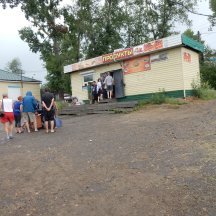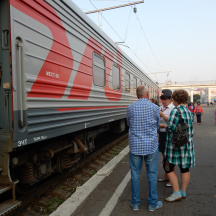Khabarovsk to Ulan Ude
- Corinne Leech

- Aug 8, 2016
- 3 min read
It was a journey of 53 hours, 2971 kilometres and two time zones. After leaving Khabarovsk promptly at 12.15 on Friday, my home for the next two nights was an upper bunk on the number 99 train.
Already established in my kupe were Helena and Natasha. After initial pleasantries Helena resumed her tapestry and, as I pulled out my knitting, there was laughter all round. Only Natasha was empty handed. Fortunately I had a spare pair of needles and wool and we all agreed on the therapeutic value of knitting whilst travelling. With the help of an English-Russian dictionary and gestures, we swapped our ages, career histories and family details. Many things got lost in our communication attempts but that didn’t matter. We enjoyed each other’s company. Natasha left at Bureya to see her grandchildren and Helena at Chitta for a nephew’s wedding.
A long train journey means plenty of time to watch the scenery go by. People stand in the corridor to stretch their legs, staring out or making acquaintances. No one moans, complains, demands even though you’re living in close proximity to strangers for a long time. Instead there’s just an acceptance that it is how it is and that the train will get them to their destination at the promised time.
On the wall,of each compartment is a schedule. It lists every stop between Vladivostok and Moscow with the arrival and departure time at each station. Most stations are one or two minutes. Every now and again there is a longer stop giving people a chance to get off the train for a short walk, smoke or to buy some food.
At Obluche we cross the first time zone. Watches are put back one hour and phones automatically reset. The need for everything to run on Moscow time became obvious.
I began chatting to Alexis. He was accompanying a concert pianist as a singer. At first I thought the concert was in a town but couldn’t understand why he kept saying 4.30. Eventually I realised that the piano was on the train and the concert was for the first class passengers. At around 4 he emerged from his kupe immaculately turned out in a black suit and white shirt and disappeared along the corridor. The Russian trains are many things to many people.
We had 37 minutes at Chitta giving me time for a brief look at the main square.
The provodnitsa, the attendant who looks after a carriage, is a busy person. Always smartly dressed to check the tickets and identity of new passengers, the provodnitsa then gives out bedding, collects tickets for the paperwork, cleans the compartment, keeping the toilets in pristine condition – quite a feat when you think that over 30 people are cycling through, using them as both a bathroom and a kitchen to wash their pots.
The landscape was always very green, a mix of pine, birch, marsh, wild flowers and crystal clear rivers. Usually there were gentle hills in the distance. Lots of remote villages with wooden houses, occasional cows and farming done in the old ways. The word ‘remote’ takes on a new meaning in Russia. Natasha had told me about picking mushrooms and berries. With the sun shining I felt some regret that my schedule didn’t allow for such things.
Between Chitta and Ulan Ude I was joined by Sveeleena, an engineer on her way for a two week holiday near Novosibirsk. With the help of the dictionary, now well thumbed, we got on well. We shared lunch. She had tomatoes, cucumbers and dill picked from her garden less than three hours before and very tasty home made rolls.
Another time zone was crossed just before Ulan Ude. Then if was time to gather my things and leave the train for a few days. Sveeleena escorted me through the station, making sure I got into an authorised taxi.
It had been a pleasure travelling on the number 99.

































Comments